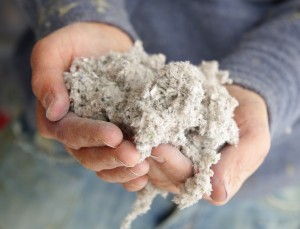Cultivation & Raw Material
Socially and Environmentally Friendly Cotton Production
Raw materials are vital for the production of our merchandise. Subsequently, we have to ensure that the materials that are used for our products are sourced under decent conditions while protecting the environment. To support our goal, we use various certification schemes coupled with specific capacity building projects, which help us to ensure that our raw materials are derived from sustainable sources. Moreover, we follow REWE Group’s Raw Material Guidelines, which specify our fundamental values and related requirements.
Together with our suppliers, we are continuously looking to increase our share of sustainable cotton in order to achieve our target of 100% sustainable cotton by 2025. Hence, we are encouraging our suppliers to procure cotton certified by Cotton Made in Africa (CmiA)or the Global Organic Textile Standard (GOTS).
The Cotton made in Africa initiative was founded in 2005 to sustainably improve the working and living conditions of smallholder cotton farmers in Sub-Saharan Africa while also promoting environmentally friendly cotton production. Through its sustainability standard, CmiA fosters continuous improvement for a social, environmentally friendly and economically viable cotton production.

In agricultural and business trainings conducted by agricultural extension staff of CmiA-verified partners, smallholders learn efficient and environmentally friendly cultivation methods. This allows them to produce sustainable cotton without using artificial irrigation, genetically modified seeds or hazardous pesticides. CmiA certified cotton produces considerably less greenhouse gas emissions and uses less water than conventional cotton.
The textile seal of GOTS reveals that no harmful chemicals have been used in fibre processing and textile manufacturing of garments from certified organic fibres (e.g. cotton, linen, silk) in the production and along the entire production chain. The aim of GOTS is to define a worldwide recognised standard for the processing of textiles, which classifies the entire life cycle of the product in accordance with ecological and social aspects that are certified by independent bodies.
Sustainable Wood and Paper Products
Most of our products are either made of wood, contain wood or their packaging is made of paper, hence, wood is a very important resource for us as a company but, more importantly, also for the life on planet earth. Forests are biodiversity hotspots and home to communities as well as many endangered species.
Moreover, forests are an important carbon sink, reducing the CO2 concentration in the atmosphere and, thereby, a crucial element on the path to limit global warming. That is why forests have to be protected and, if used for wood production, managed sustainably. Hence, we contribute to sustainable forest management by deliberately aiming to increase the procurement of Forest Stewardship Council (FSC) or Programme for the Endorsement of Forest Certification (PEFC) certified wood, paper products and packaging. Along those lines, we also committed ourselves to make our product paper packaging for our private label products more sustainable by only using recycled or certified fresh fibre by the end of 2020.
Responsible Sourcing of Fish, Seafood and Palm Oil
Fish and seafood products are gaining importance in many people’s diets around the world, thus, the demand for fish and seafood products has been significantly increasing. Through pledging to increase the share of Marine Stewardship Council (MSC) certified wild-caught fish and se afood products, we support responsible fishing practices and help establish them in the fishing industry. The same applies to farmed fish and seafood products; we contribute to responsible aquaculture practices by sourcing Aquaculture Stewardship Council (ASC) certified fish and seafood products.
afood products, we support responsible fishing practices and help establish them in the fishing industry. The same applies to farmed fish and seafood products; we contribute to responsible aquaculture practices by sourcing Aquaculture Stewardship Council (ASC) certified fish and seafood products.
The cultivation of palm oil often entails ecological and social problems such as the irretrievable destruction of rain forests, which are a vital habitat for countless endangered plants and animals as well as local populations. To tackle these issues, we committed ourselves to the exclusive use of 100 % Roundtable on Sustainable Palm Oil (RSPO) certified palm (kernel) oil. The ambitious goal of this commitment is designed to facilitate the traceability of palm oil over the long term through compliance with defined supplemental criteria.
